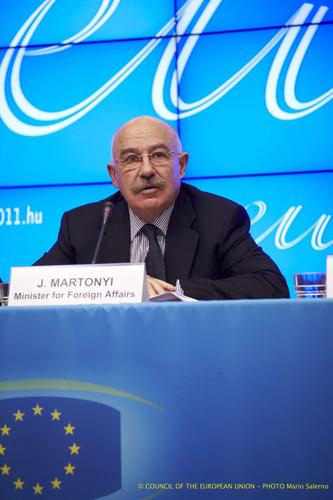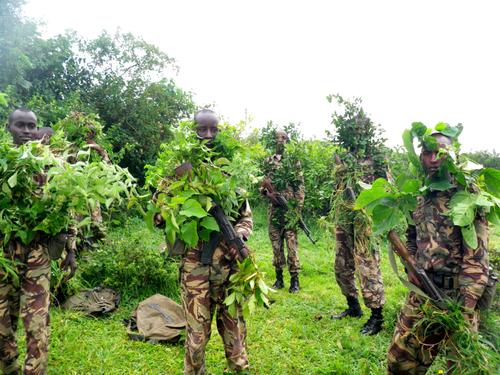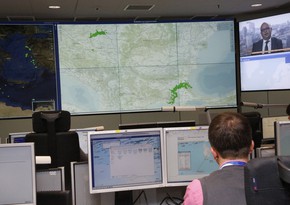J. Martonyi (Hungary): resolving the Libyan situation in the long term is not just a military operation
(BRUXELLES2/Entretien) Avant le Conseil des ministres des Affaires étrangères du 12 avril, j’ai pu posé quelques questions au ministre Hongrois des Affaires étrangères (la Hongrie assure la présidence de l’Union européenne), Janos Martonyi, et recueillir ses impressions sur la situation politique et humanitaire en Libye. Une approche intéressante car elle émane d’un homme qui a connu “l’autre coté” du rideau de fer, était aussi aux manettes de la diplomatie hongroise lors de l’adhésion du pays à l’OTAN et de l’intervention au Kosovo en 1999.
Libya seems to be in a political stalemate, what do you plan to get out of there...
La question c’est comment construire la transition en Libye. C’est un problème que nous avons à chaque fois qu’il y a une dictature. Dans un régime politique autoritaire, aucune opposition bien organisée ne peut se former. On ne peut même pas apprécier la notion de l’opposition en tant que telle (comme nous le faisons dans nos démocraties). Il est pourtant évident qu’on ne peut pas continuer à gouverner à l’ancienne, sans présenter une réelle alternative pour surmonter les difficultés. Dans cette situation extrêmement complexe et préoccupante, la communauté internationale a une responsabilité importante comme les pays voisins qui ont un intérêt direct dans la stabilité de la région. (…) Nous avons vu la très large solidarité internationale qui vient d’émerger en moins d’un mois pour tenter de juguler la politique dévastatrice et les atrocités débridées du régime Kadhafi. On ne peut pas parler d’une impasse. Mais il faudra encore du temps pour trouver les réponses les plus adéquates, autant sur le plan militaire que politique et social, en impliquant tous les acteurs concernés, y compris l’opposition libyenne.
“In an authoritarian political regime,
no well-organized opposition can form”
Most Eastern countries seem reluctant about a military operation in Libya. How do you explain it? What is Hungary's position?
I don't think there is a position specific to Central and Eastern Europe on Libya. Each country in our region has an approach to this issue based on its membership of NATO or the EU, while participating in the decisions of these organizations. For Hungary, although we are not a member of the UN Security Council, our country has always supported the adoption and execution of the two Council resolutions (1970 and 1973) relating to Libya. We have also supported the NATO intervention from the start. A choice which obeys on the one hand the priority given to the protection of the Libyan population and, on the other hand, the military effectiveness which can be ensured under the leadership of NATO. We would have been happy if the Gaddafi regime had followed the Security Council resolutions of its own volition. But it became clear very early on that without a determined military intervention, bloodshed remained possible which absolutely had to be prevented.
“Without a determined military intervention,
a bloodshed remained possible which it was absolutely necessary to prevent”
You are not participating in this mission?
No express request has been addressed to us, neither in relation to the current military operations (to protect the civilian population and to force the regime to an arms embargo, as well as respect for the no-fly zone), nor for a Hungarian military contribution. It should nevertheless be emphasized that NATO took over the overall direction of the military operations. A decision taken by consensus, in which Hungary took part.
“The long-term settlement of the Libyan situation
is not limited to the military operation"
Until when to continue operations?
The mandate provided by the Security Council resolution stipulates that operations continue as long as the protection of the population makes them necessary. But we also remain aware that the settlement of the Libyan situation in the long term is not limited to the military operation. The priority is for the Libyan people to be able to take their destiny into their own hands.
You were in Egypt recently, how do you feel about the humanitarian situation in Libya?
Effectivement, nous devons consacrer toute notre attention à la situation humanitaire que ce soit en Libye ou dans les territoires bordant ses frontières. Lors de ma visite, j’ai pu constaté que si la situation humanitaire reste encore maîtrisable grâce aux efforts des autorités locales et des organisations internationales ou des ONG travaillant sur le terrain. Mais elle s’avère toujours incertaine et peut tourner au pire. L’UE doit continuer à élaborer des plans pour soutenir ces actions humanitaires pour protéger la population civile. Cela permettra si la situation le rend nécessaire, d’appuyer les efforts de l’ONU.
Shouldn't we deploy - as we have done in other crises (Georgia, Yugoslavia) European observers to the borders of potentially fragile countries (Niger, Sudan, Tunisia) in order to observe the situation, prevent possible slippages?
La question du déploiement des observateurs de l’Union européenne ne s’est pas encore posée concrètement. Mais pourquoi pas. L’Union continue à poursuivre des consultations avec les partenaires internationaux (NB : l’Union africaine) ainsi qu’avec les pays de la région. Et c’est sur cette base qu’on pourra prendre des décisions sur la forme de notre action ultérieure.



